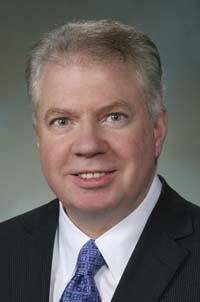By Kylee Zabel
WNPA Olympia News Bureau
Could this be “the year of the Grand Bargain in Olympia?”
Sen. Ed Murray believes so after state House of Representative and Senate leadership members met Thursday at an Associated Press briefing to discuss priorities for the coming legislative session, all agreeing to make funding education the top priority for both houses.
The legislative session begins Monday.
With the recent formation of the Senate coalition in December, questions were raised concerning the Senate’s ability to work in a bipartisan way. When asked about his priorities this session, Sen. Murray (D-District 43, Seattle), majority leader, said the goal of the body was to govern responsibly.
Referencing Alan Rosenthal, Ph.D., of Rutgers University, “Legislative bodies, by nature, need to be at points of contention and those different points need to come together. Legislative bodies that work, compromise,” Murray said.
On the make-up of the hybrid organization in the Senate, Sen. Rodney Tom (D-District 48, Medina), the new Senate coalition majority leader this session, said the coalition will work in a sensible way.
“We’re not doing this for window-dressing,” he said.
Nevertheless, there remains some disagreement on its composition. The coalition presently has six Democratic committee chairs and six Republican committee chairs, with three committees planning to be co-chaired by one Democrat and one Republican senator.
Democratic leaders in the Senate are in favor of appointing co-chairs to each committee to make the bodies totally bipartisan, but Republicans disagree.
Having co-chairs is not a functional way to approach the session, Tom said. He would like to play to the strengths of each Senate member, allowing for power-sharing.
Murray agreed, saying there is a great opportunity to take advantage of talent this session.
Education, first and foremost
But what seemed to be on everyone’s mind Thursday was education, not just on how the body politic might work.
Enumerating his caucus’s priorities, House Minority Leader, Rep. Richard DeBolt (R-District 20, Chehalis), focused on addressing the looming 2018 deadline from the Supreme Court’s McCleary decision directing the Legislature to add funds to close the K-12 achievement gap.
To make education the top priority, DeBolt said education funding needed to have a separate budget formed in a “clear and transparent manner” and decided on before any other funding in the state.
“What is more of a priority than funding it first?,” DeBolt asked.
All legislators in attendance agreed that, in order to fully address the constitutional mandate on public education, revenue improvements and reforms were crucial.
According to Tom, the state allocates 43 percent of its budget to education funding.
“However, while we’ve recently spent more, the results have yet to show improvement,” he said.
Murray credited the lack of results to current tax policies, which have placed Washington in the bottom one-third taxing states.
“When you pay for a bottom-third education system, you get bottom-third results,” Murray said.
Tom entertained another method of receiving additional funds by using Internet sales tax, anticipated to produce $500 million this biennium.
But, as discussed at the conference, in order to lessen the achievement gap formed by the increasing number of poor and minority students failing to meet public education requirements, reforms must take place, the legislators said.
Speaker of the House, Rep. Frank Chopp (D-District 43, Seattle), suggested that the focus must always be on the student.
“We need to look beyond just the classroom and teacher,” he said.
In doing so, he cited the Apple Health program as an example, which he said serves about 750,000 children in Washington.
To excel in school, a “student needs to be healthy and ready to learn,” Chopp said.
Murray said the achievement gap is directly related to poverty in the state.
In order to effectively close the gap, the state must help “grow the middle class by helping those who are not in it,” Murray said.
But Debolt argued, “If we’re going to look at the education gap, we can’t just use platitudes and placations about politics.”
If the Legislature wanted to address poverty in its relation to public education, it shouldn’t place people in more programs but rather find them a job, he said.
“The achievement gap is about putting people back to work in areas with high and persistent unemployment, DeBolt said. “If we think we’re going to program our way out of it by using big government tactics, we’re in serious trouble.”
While all-day kindergarten sparked discussion last session, Tom urged that, in order to address the gap, legislators needed to look at dropout rates and the bottom 40 percent of students in Washington.
“Some students start behind and can never catch up,” Tom said.
Talk to us
Please share your story tips by emailing editor@kentreporter.com.
To share your opinion for publication, submit a letter through our website https://www.kentreporter.com/submit-letter/. Include your name, address and daytime phone number. (We’ll only publish your name and hometown.) Please keep letters to 300 words or less.

